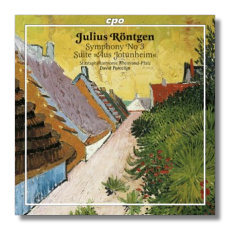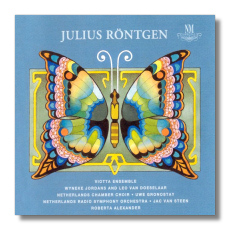
The Internet's Premier Classical Music Source
Related Links
- Latest Reviews
- More Reviews
-
By Composer
-
Collections
DVD & Blu-ray
Books
Concert Reviews
Articles/Interviews
Software
Audio
Search Amazon
Recommended Links
Site News
 CD Review
CD Review
Julius Röntgen

One of the Great Unknowns
- Symphony #3 in C minor, 1910 (32:46)
- Suite "Aus Jotunheim", 1892 (25:10)
Staatsphilharmonie Rheinland-Pfalz/David Porcelijn
CPO 777119-2


- Serenade for Seven Winds, Op. 14, 1876 (27:58) 1
- Thema mit Variationem for Piano 4-Hands, Op. 17, 1878 (10:32) 2
- 3 Motetten (17:14) 3
- Symphony in C Sharp minor, 1930 (18:28) 4
1 Viotta Ensemble
2 Wynecke Jordans & Leo van Doeselaar, piano
3 Netherlands Chamber Choir
4 Roberta Alexander, soprano
4 Netherlands Radio Symphony Orchestra/Jac van Steen
NM Classics 92096
Occasionally I see someone claim that there surely aren't any unknown geniuses, because quality will out; or that the basic established canon of great composers is sufficient; and once I noted that someone on an electronic discussion group, perhaps this one, announced that his collection of recordings was "complete." My own experience, in what has happily not been a brief existence, is that there seems to be an unlimited supply of exciting music out there, such that I keep being surprised and delighted by new discoveries. Thanks to Mimi Ezust and also Scott Morrison, who reviewed the first disc listed above, I have recently discovered some of the music of Julius Röntgen (By the way, if you Google "Röntgen" you are going to get over a million hits, because the composer shares a surname with a famous physicist who gave his name to a unit of energy. (There is an umlaut on the "o" of each name but searching without adding an "e" is usually more successful then with one; I cannot type the one and choose to omit the other.)
Born in Leipzig, and a student of Reinecke, this Julius Röntgen [Roentgen] (1855-1932) was a friend of both Brahms and Grieg, and the CPO recording shows why. I would not insult either of these works by calling them derivative, but there are correspondences between these works and the styles of the other composers mentioned. As a matter of fact, Brahms found it necessary to apologize for having inadvertently plagiarized the main theme of own second symphony's first movement from the main theme of the first movement of Röntgen's wind serenade; Röntgen dedicated the Suite Aus Jotunheim to Grieg. Röntgen's father and maternal grandfather both played in the Gewandthaus Orchestra and Julius was a Wunderkind who composed from the age of nine. He was one of the first to perform in the Concertgebouw and in 1884 helped found the Amsterdam Conservatoire, the director of which he later became.
As his dates indicate Röntgen's compositions spanned five and a half decades. Their total number was over eight hundred! They included over twenty symphonies and many concertos, including more then one for violin and for cello, as well as for piano. A funny mis-translation from the Dutch in the notes to the NM recording says that "Röntgen composed most of his symphonies by the end of his life," but the use of a Dutch dictionary assures me that this should have been rendered something like "the bulk of his symphonic output occurred in the last years of his life." One of those late symphonies was identified as a bitonal symphony.
I have not heard it yet; the ones I have heard are tonal with perhaps some chromatic elements, and Röntgen can certainly be identified as a Romantic or post-romantic composer, with a strongly lyrical inclination. He never sounds tired or hackneyed. Based on what I have heard to date, Röntgen's voice is fresh and his invention seems unfailing. His melodic, rhythmic and contrapuntal writing is satisfying. His musical textures and (multiple) musical lines are always clear. He wrote especially well for the woodwinds and horns.
My favorite of the works mentioned here is the late C# minor symphony, in one movement. It is exceptionally quiet, except for a loud passage a few minutes in, and another passage of rising tension later. The last third of the work, following a brief pause, features a high, wordless and soft but clear soprano, interspersed with comments from the orchestra. The work is nothing short of exquisite. The earlier symphony is more traditional, in four movements. The suite is very pleasurable, as are the other works. The recording quality is excellent on both releases.
Copyright © 2007, R. James Tobin




















